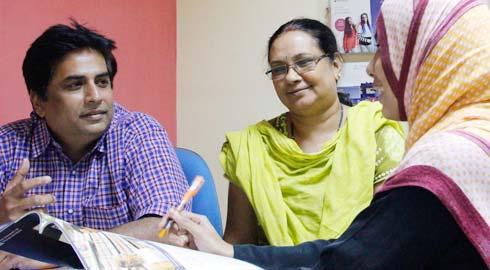Being a parent, it is natural for you to be interested in your child’s education. You are likely to have a lot of questions related to overseas education. Tough decisions about when, where and what to study are usually made by the students, but as a parent, you may want to be involved in the decision-making process. We believe by being well informed, you can play a wonderful supporting role as a parent and mentor for your child, as they begin their long study abroad journey with us.
It’s quite natural to have dozens of fears and apprehensions in your mind while you plan your child’s future abroad but highly unlikely you would want to shatter his/her dreams for the sake of your fears. Below you’ll find a list of helpful suggestions on how you can assist your child through the entire study abroad process and later when they move abroad.
Stay informed
You’re likely to feel a lot more secure about your child’s education abroad once you do some effective research. Start by gathering information on your child’s chosen study destination. Look into the course curriculum, campus life abroad and the accommodation options available for international students. You may also want to check with the admissions committee of the university that your child has shortlisted. If you don’t know how to reach or write to the university, we can surely help you.
You can use our online resources to gather all the information you need. An education abroad can pose a lot of challenges and potential difficulties for you and your child. So be prepared to ask the right questions to the college representatives using all the information you’ve gathered.
Check out the amazing ideas that make study abroad simpler.
Safety
Safety of a student studying abroad is one of the primary concerns these days. As a parent you might have premonitions about sending your child for overseas education but think carefully – how safe is your own native country? Safety concerns will arise in every parent’s mind and it as important as any other issues. Students’ safety is one of the main concerns of any reputed institutions abroad so it’s natural that most universities abroad will have their own safety protocols for international students.
As the departure date of your child nears, you can have a lot of anxiety and second-thoughts creeping up in your head. We know how difficult it can be to part with a loved one, but it’s important to understand just how much the student benefits from an independent living and foreign exposure.
Being supportive and learn to let him/her go is the key here to let them know that you stand by their decisions. Give your child the information and resources he/she needs to make better decisions and educate them how to be safe and cautious once they reach their study destination. You should encourage your child to cultivate and utilise their “street smart” skills while living abroad.
Pack
Help your child with his/her packing. It’s important to pack light, but wisely. Draw up a checklist detailing all the things that he/she will need for the course duration abroad.
Check the weight of the luggage, and see if your child is able to move around with it. Your child will have to carry that luggage around for a while, so it’s important to make sure he/she is able to handle the load.
Communicate
Work out a plan of communication before the departure date. It is important to be flexible with your plan because it may not always work out that way. Your child may have Internet issues or phone connection delays — so be prepared for such instances.
Don’t be over-demanding and expect them to call you every day. Try and understand their difficulties and make arrangements to connect at a time, which is favourable for your child as well as you.
Make an effort to connect with other parents whose children have previously studied abroad and learn about their experiences.
Students and parents should both have a set of emergency contacts with them at all times. You should note down the contact details of your child’s college representatives or classmates.
Lisette Miranda, CEO of PINC International, started a program on Snapchat to give both parents and prospective program participants an up-close look at day-to-day life with a PINC programme. According to her: “It’s our primary job as program providers to ensure parents that their children are safe and this investment is worthwhile. Once parents are on board though, we’ve noticed how supportive and encouraging they are of their children to make the most of their time abroad.”
Finances
By devising a sound financial plan, you can help your child manage his/her monthly expenses well. Use your experience and knowledge to guide your child on all issues related to money.
To limit spending and avoid needless expenditure, make a list detailing expenses that are mandatory and expenses that can be avoided. Try to find out various ways of reducing your child’s expenditure, for example, getting him/her an international calling card.
Responsibilities
Each child has different maturity levels. Give it some time for your child to settle down until she/he starts making plans on their own. Have a talk about the financial, social and academic responsibilities with your child. Encourage your child to solve his/her own issues that may arise while studying abroad. Get them to do the bulk of research on matters related to overseas education. This will not only empower your child, but will also help him/her face any challenges that may emerge during his/her stay abroad. Place your trust on your child and give him/her the confidence needed to make his/her own decisions while studying abroad.
Your child is a growing adult who has to live his/her life ultimately the way he/she plans to. Keeping a tab at every step and assessing their movements may not help them much. Don’t over-think that your child will be influenced by the Western culture or so because ultimately it’s we who create our own culture.
Food & accommodation
As a parent, you can teach your child to be more adaptive to different cuisines abroad though they might be used to home-cooked food. You can also teach your child to cook his/her own food to save up on restaurant bills. But avoid calling him/her every minute, asking what he/she had for lunch or dinner. Your child may not be in a mood to eat or might be really busy with the studies so make sure you give some space.
Perhaps you can do some homework and find some local restaurants that serve Indian food. And when it comes to accommodation, you can follow-up with university representatives to find a suitable place for your child to stay.
Visits
You may want to visit your child while he/she is living abroad. Plan a visit only at a time that is convenient for your child. You don’t want to be showing up with your luggage during their exam time.
Remember that while it may be a vacation for you, your child still has responsibilities. You may miss your child a lot, but it’s important for him/her to spend some quality time immersed in a foreign culture and engaged with a new company to grow as an individual.
Returning home
Just as you must prepare your child for his/her chosen study destination, you must also embrace the fact that on his/her return to India, he/she may encounter a ‘reverse culture-shock’.
Allow your child a period of adjustment when they first return home. Encourage your child to keep in touch with the people he/she met while studying abroad. These connections can last a lifetime. Listen to what your child has to say — he/she probably might have a great deal of experiences to share with you.
We hope you found our suggestions useful. Why don’t you share your experiences with us? Or tell us your plans for your child’s career.
Last but not least, you can have a detailed conversation with our advisors. They will answer all your questions related to overseas admissions and help you with some additional information that might help you and your child plan better.

















































